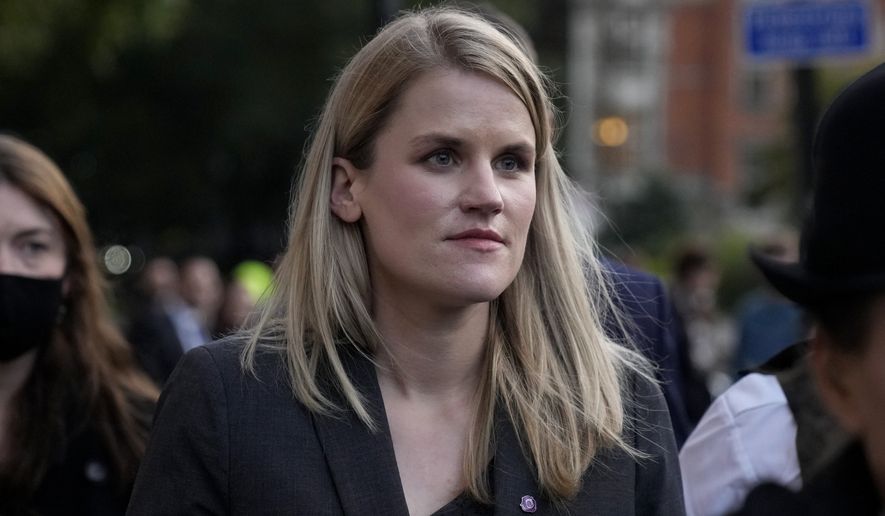Two former Facebook workers’ testimony to House lawmakers on Wednesday revealed that a major barrier to any new crackdown by Congress on big tech is the divergent views of Democrats and Republicans on censorship.
One former Facebook worker called for any tech crackdown to yield “less censorship,” while the other ex-employee refused to say whether tech companies should censor Americans’ speech.
House Energy and Commerce Committee lawmakers met Wednesday at a subcommittee hearing to discuss options for holding large technology companies accountable, including by changing legal liability protections afforded through Section 230 of the Communication Decency Act.
Former Facebook employee Frances Haugen, a self-described whistleblower, captured public attention earlier this year when accusing Facebook of harming kids and supplied documents from her former employer to Congress and journalists.
Her criticisms of Facebook’s alleged harms won praise from both Democrats and Republicans, but her comfort with large tech companies deciding who is free to speak online raised eyebrows among Republicans.
At Wednesday’s hearing, Ms. Haugen repeatedly refused to directly answer questions from Rep. Cathy McMorris Rodgers, Washington Republican, about whether big tech companies should restrict Americans’ speech.
“The question is, yes or no, do you support them censoring constitutionally protected speech under the First Amendment?” Ms. Rodgers asked.
“I believe that we should have things like fact-checks included along with content,” Ms. Haugen answered. “I think the current system—”
“I guess I take it as a no,” interjected Ms. Rodgers.
“I think there are better solutions than censorship that we should be using,” said Ms. Haugen.
Ms. Haugen’s commentary differed sharply from former Facebook worker Kara Frederick, who now works at the conservative Heritage Foundation. Ms. Frederick, who has described her work at Facebook as involving the company’s counterterrorism analysis program, called big tech companies “an enemy of the people.”
“Let the whistleblower docs speak for themselves, holding big tech accountable should result in less censorship, not more,” said Ms. Frederick. “In fact, the First Amendment should be the standard from which all Section 230 reforms flow.”
Democratic and Republican lawmakers have made many proposals to curb tech companies’ power, ranging from leveraging antitrust action to changing laws affecting how platforms govern their users’ speech. Many of the proposals have stalled amid Congress and the Biden administration prioritizing other legislation involving social spending and infrastructure.
Democrats sounded keen Wednesday to spur momentum for new tech rules ahead of next year’s midterm elections that could change the balance of power in Congress, and which party takes the lead in writing new laws for digital platforms.
“There’s a bipartisan desire to reform the courts’ interpretation of Section 230 and the American public wants to see us get things done,” said Rep. Mike Doyle, Pennsylvania Democrat. “I urge all my colleagues, Republican and Democratic, to bring their ideas forward now and let’s work together on bipartisan legislation because we can’t continue to wait. The largest tech companies would like nothing more than for Congress to fight amongst itself while nothing happens.”
While various proposals to curb tech companies’ conduct have garnered bipartisan support, Democrats worry about misinformation and disinformation spreading more widely online, while Republicans express concern about people’s voices getting silenced by companies and governments.
“It seems like as we’re working on key reforms like protecting civil rights, accountability for social media companies, protecting our kids, the main opposition by Republicans today, the talking point of the day is they want a license to lie,” Rep. Darren Soto, Florida Democrat, said at the hearing. “The right to lie without consequence, even though deliberate lies are not free speech under New York Times v. Sullivan, according to our Supreme Court.”
Ms. Rodgers, however, said she perceived tech companies’ actions as one-sided against conservatives, and she believes the American people were fed up.
“Obviously, many Americans have lost trust with big tech and it’s because they are arbitrarily censoring speech that they don’t agree with and it seems like the censorship is in one direction — it’s against the conservative content,” Ms. Rodgers said. “So as we think about the solutions as to how we’re going to hold big tech accountable we absolutely have to be thoughtful about bringing transparency and accountability.”
Whether the shared animosity for big tech overcomes the deficit of trust between Republican and Democratic lawmakers will determine whether any tech legislation reaches the House and Senate floor before the lawmakers stand for election again.
• Ryan Lovelace can be reached at rlovelace@washingtontimes.com.




Please read our comment policy before commenting.